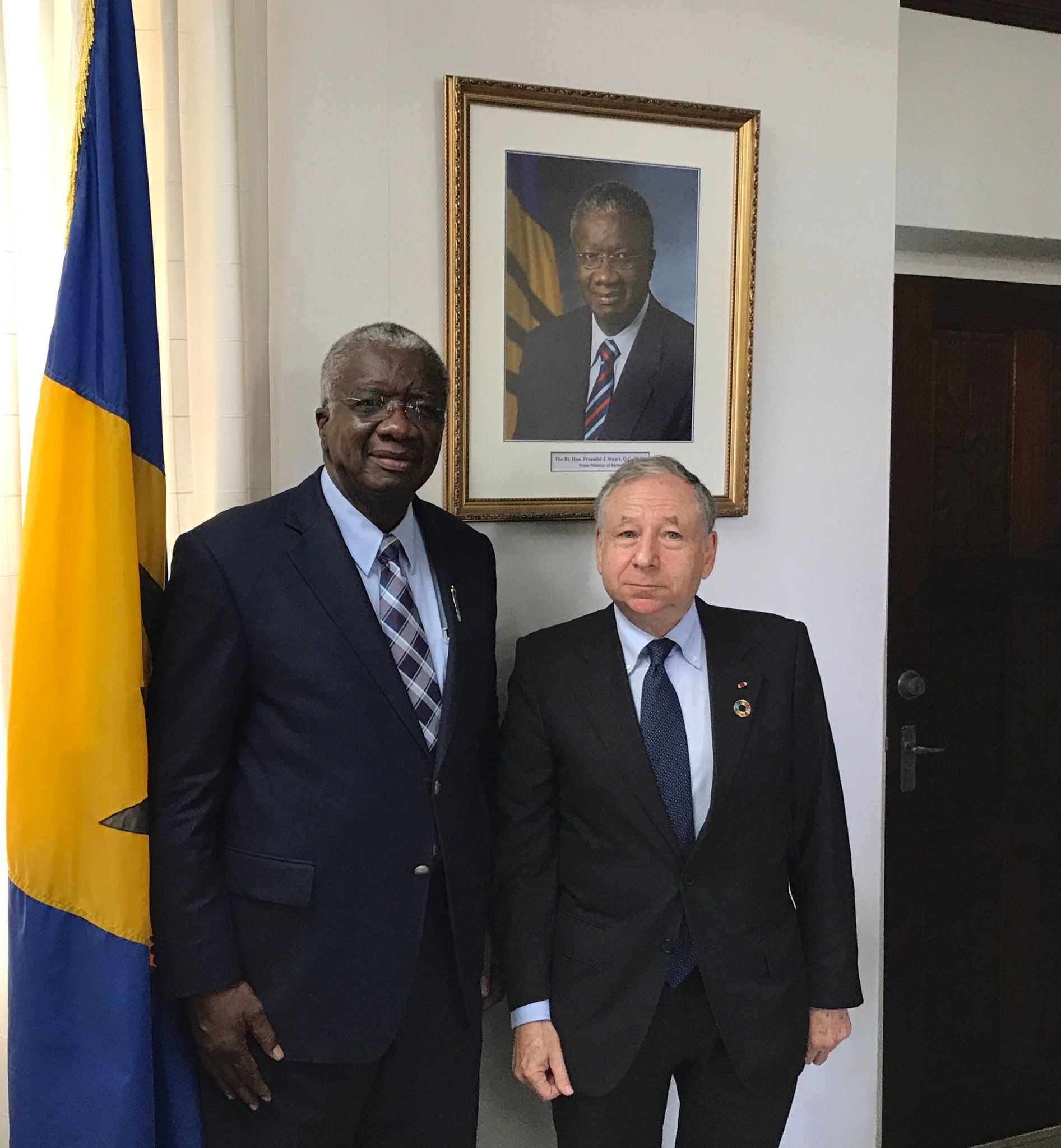An island in the Caribbean, Barbados is a high-income country with the population of 285,000 inhabitants. WHO estimates 19 road traffic fatalities annually, with the rate of 6.7 deaths per 100,000 population, where pedestrians account for the highest burden of road traffic fatalities in Barbados, reported up to 39 percent. Barbados has strong laws addressing seat-belt use; however, drink-driving, speeding, child restraint and helmet laws need to be improved. Barbados is not a contracting party to any UN Road Safety Conventions.
Ministerial Meeting with Hon. Freundel Stuart, Prime Minister of Barbados; Hon. Michael Lashley, Minister of Transport and Works and Chair of the Barbados National Road Safety Council; Hon. John Boyce, Minister of Health

The Special Envoy presented his recent activities and the terms of his mandate. The Special Envoy gave an overview of road safety situation in Barbados and around the world, supported by some statistics. The Special Envoy highlighted potential solutions, such as better education, law enforcement, improved road infrastructure, post-crash care and safer vehicles. Use of helmets and seatbelts as well as enforcement on drink driving were among issues particularly relevant to the Ministry of Transport. The Special Envoy encouraged accession to the UN Road Safety Conventions, as Barbados is not a contracting party to any of the six Conventions. The Minister of Transport expressed interest in improving drivers’ licensing, training centres, and law enforcement. The Special Envoy shared about the Vision Zero programme and suggested that it is implemented in the country.
Meeting with road safety stakeholders
The participants of the meeting discussed about their potential collaboration to reduce the number of fatalities and injuries on Barbados roads. The Special Envoy insisted on the need to build a strong data collection system, and suggested some best practice examples for comparison. The Special Envoy presented five pillars of the global plan for the Decade of Action for Road Safety and emphasized the inclusion of road safety in SDGs 3.6 and 11.2. The Special Envoy also shared about the establishment of a potential UN Road Safety Fund. In conclusion, the Special Envoy highlighted the importance of coordination between stakeholders and encouraged all stakeholders to establish a strong partnership. The following stakeholders were represented at the meeting:
o Ms. Alice H. Shackelford, UN Resident Coordinator
o Ministry of Transport and Works
o Caribbean Development Bank
o Rubis Caribbean
o Barbados Motoring Federation
o Christian Council
o Insurance Association
o National Road Safety Association
Meeting with UN Sub-regional Team in Barbados
On 8 August, the Special Envoy met the UNST in Bridgetown and presented his mandate as well as gave an overview of his recent activities. He reminded the UNST that Barbados is not a contracting party to any UN Conventions and encouraged accession. The Special Envoy gave an overview of five pillars of the Global Plan, placing an emphasis on education and law enforcement. The UNST presented their activities and outlined their road safety challenges, such as lack of law enforcement on drink driving and drug use. In particular, the UNST highlighted the issue of data collection coordination with several governmental institutions. The Special Envoy insisted on the implementation of a Vision Zero programme in Barbados, given the low absolute number of road traffic fatalities. Special Envoy encouraged the UNST to advocate for the inclusion of road safety on the agenda of all countries in the Caribbean. The following members of the UN Sub-regional Team presented at the meeting:
o Mr. Stephen O’Malley, UN Resident Coordinator
o Ms. Michelle Brathwaite, HR Office
o Mr. Godfrey Xuereb, PAHO/WHO
o Mr. Sylvester Cadette, ITU